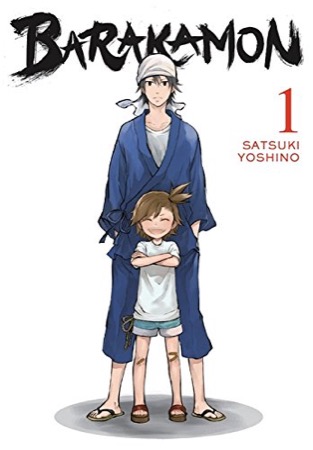Barakamon Volume 1

I had the wrong impression of Barakamon. I’d heard it compared once too often to Yotsuba&!, which I adore, but I suspect that’s just because there’s a smart-alec kid co-starring. The tone is very different. In my opinion, a better comparison to Barakamon would be Green Acres: high-powered city guy moves to the country and learns the virtue of relationships with a variety of rural character types.
Handa is a talented calligrapher who’s been overcome by the stress of competitions in the city, so he’s moved to a small island village to recover his spirit in solitude. His work has been dull and conformist, and when told so, he attacked the messenger, a respected director of the company, so he has a lot to process. And atone for.
Naru is quite the, as the first chapter title has it, “energetic child”. She’s irrepressible, curious, and outspoken. She’s been hanging out in the formerly empty house Handa rents, so the two are thrown together. He keeps throwing her out (literally), but she keeps coming back. Like a sickness, she’s impossible to get rid of, but she provides naive wisdom and inspiration.
The series by Satsuki Yoshiko is billed as a comedy, but the humor is hit or miss. I didn’t find any of it very funny, personally, but that’s because Naru wore on me quickly. The most appealing part, to me, were the images of the natural setting and island life. That was refreshing to the spirit.
As Handa moves in, he quickly learns about the willingness of neighbors to help strangers. He meets more kids at the village school and gets roped into babysitting. He makes a friend, the no-good son of the woman who makes food for him, whom he inspires into working harder through his own dedication.
The last chapter ends on a high note, with the village coming together for “mochi-picking”, a kind of dedication ceremony that involves throwing wrapped rice cakes at everyone in town. It’s an event that brings everyone together and reminds Handa that one doesn’t have to be the best to enjoy participating. Recovering that love of activity for its own sake, regardless of whether one “wins”, is an important life lesson to him and the reader. (The publisher provided a review copy.)
